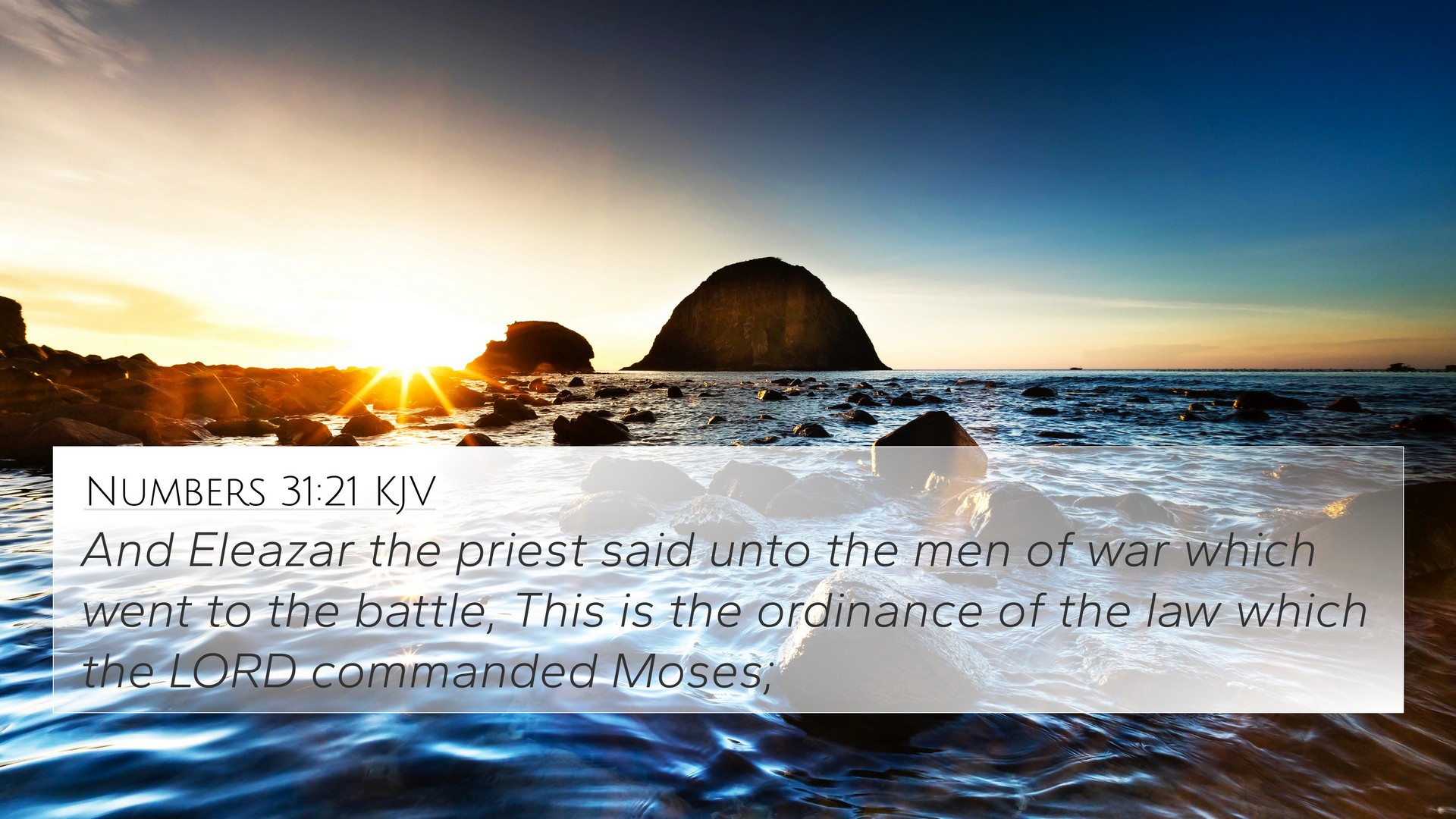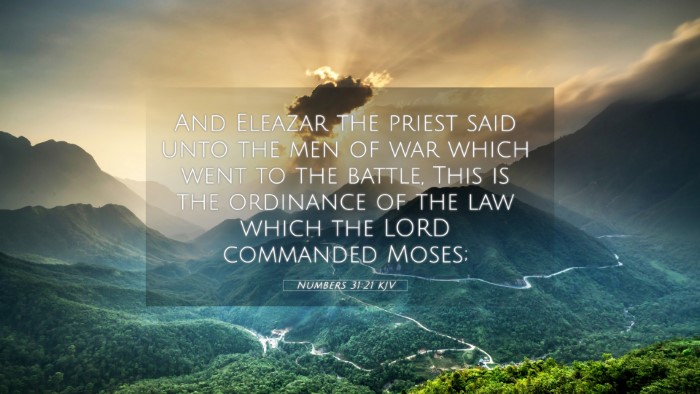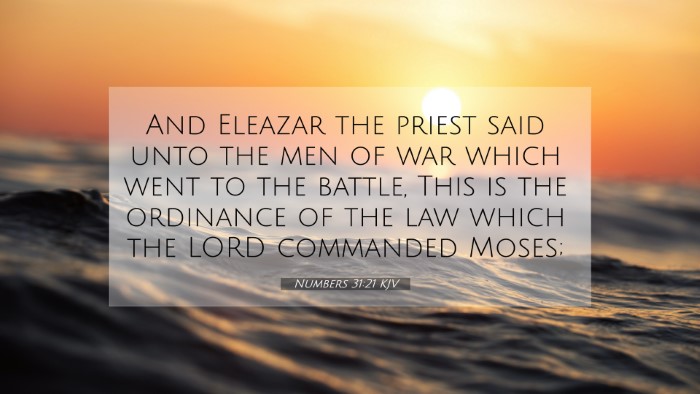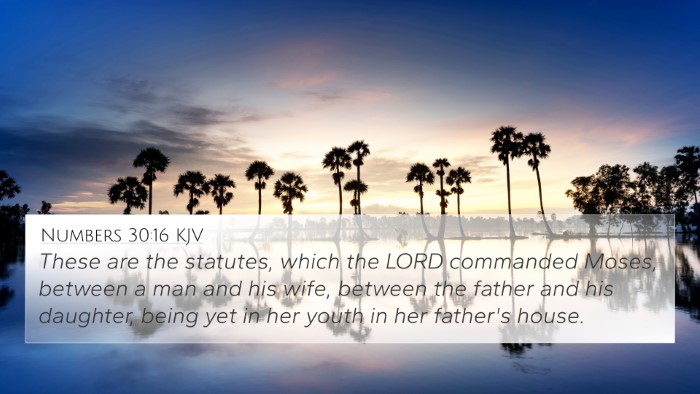Understanding Numbers 31:21
Verse Reference: Numbers 31:21 states, "And Eleazar the priest said unto the men of war which went to the battle, This is the ordinance of the law which the Lord commanded Moses."
Summary of the Verse
In this passage, Eleazar the priest serves as a mediator between God and the Israelite warriors following their victory over the Midianites. He instructs the men regarding the laws God has ordained through Moses, emphasizing the importance of adhering to divine command in all matters of warfare and conduct.
Key Themes and Insights
- Divine Command: The verse highlights the importance of following God's laws as presented through Moses, reiterating the foundational role of divine instruction in guiding the Israelites' actions.
- Priestly Mediation: Eleazar’s function as a priest underscores the role of mediators in conveying God's message and directives to the people.
- Holiness in Warfare: The guidelines given after a battle demonstrate that even in conflict, the Israelites were meant to maintain a high standard of holiness and righteousness.
Commentary Insights
Matthew Henry: Henry emphasizes the priest's role in overseeing the process of purification and the offerings required post-battle. He underlines that priests were responsible for communicating God's laws to ensure that the people remained righteous.
Albert Barnes: Barnes notes that Eleazar's instructions articulate a clear line of authority from God to Moses and then to the priests, indicating that all laws originated from divine command, reflecting the genuine intention of God concerning the conduct of His people.
Adam Clarke: Clarke elaborates on the ceremonial aspects associated with the aftermath of warfare, highlighting that every instruction given was meant to sanctify the actions of the Israelites and to show their dependence on God.
Bible Cross-References
- Exodus 20:1-17: The Ten Commandments, exemplifying the fundamental laws given to the Israelites.
- Leviticus 4:5-10: Instructions for priests on the offerings, showing ritual purity in the presence of God.
- Numbers 15:22-29: Laws concerning unintentional sins, emphasizing accountability and reliance on God’s mercy.
- Joshua 22:29: The continuing obedience to God’s commands as a measure of faithfulness after the conquest of Canaan.
- 1 Peter 1:16: “Be holy, for I am holy,” connecting the call to holiness to New Testament believers.
- Romans 12:1: The necessity of presenting our bodies as living sacrifices, further connecting holiness with daily living in faith.
- Hebrews 4:13: The thoroughness of God's oversight regarding our actions, reminding us of His authority in every aspect of life, including warfare.
Thematic Bible Verse Connections
Numbers 31:21 serves as a pivotal point that illustrates numerous connections throughout the Bible regarding God’s mandates:
- Authority of Scripture: Much of the guidance given to the Israelites under Moses corresponds with later teachings in the New Testament, emphasizing the continuity of God’s authority in scriptures.
- Holiness in Community: The theme of pursuing holiness resonates throughout the scripture, linking the Old Testament ordinances with New Testament moral exhortations.
- Divine Judgment: The deaths and consequences discussed in this chapter also reflect the overarching narrative of both God's mercy and His justice in the scriptures.
Applying the Insights
When studying Numbers 31:21 and its implications, one can draw various applications:
- Understanding Authority: Recognizing that all authority ultimately derives from God guides our actions and decisions today.
- Importance of Obedience: Just as the Israelites were commanded to follow God's laws, believers today are also called to live according to the teachings of Christ.
- Community Standards: This passage prompts modern readers to consider the importance of maintaining ethical standards and communal holiness in the church.
Conclusion
Numbers 31:21 is not merely an ancient commandment but a timeless ordinance reflecting the nature of God's law, the holiness expected from His people, and the ongoing relevance of obedience to His guidance. It invites believers to explore connections within the Scripture, providing a framework for understanding and applying biblical principles in today's context. This verse intimately connects with numerous others, offering a foundation upon which many key theological themes stand, from obedience to holiness, continually linking the past with present faith practice.



